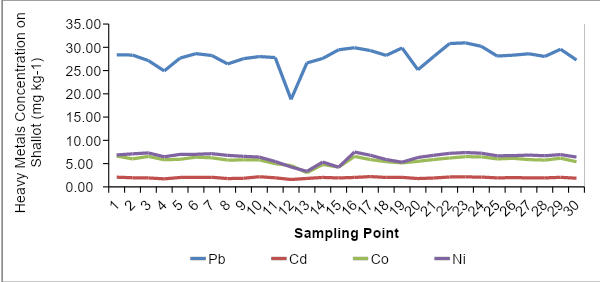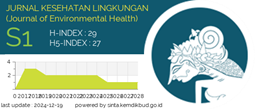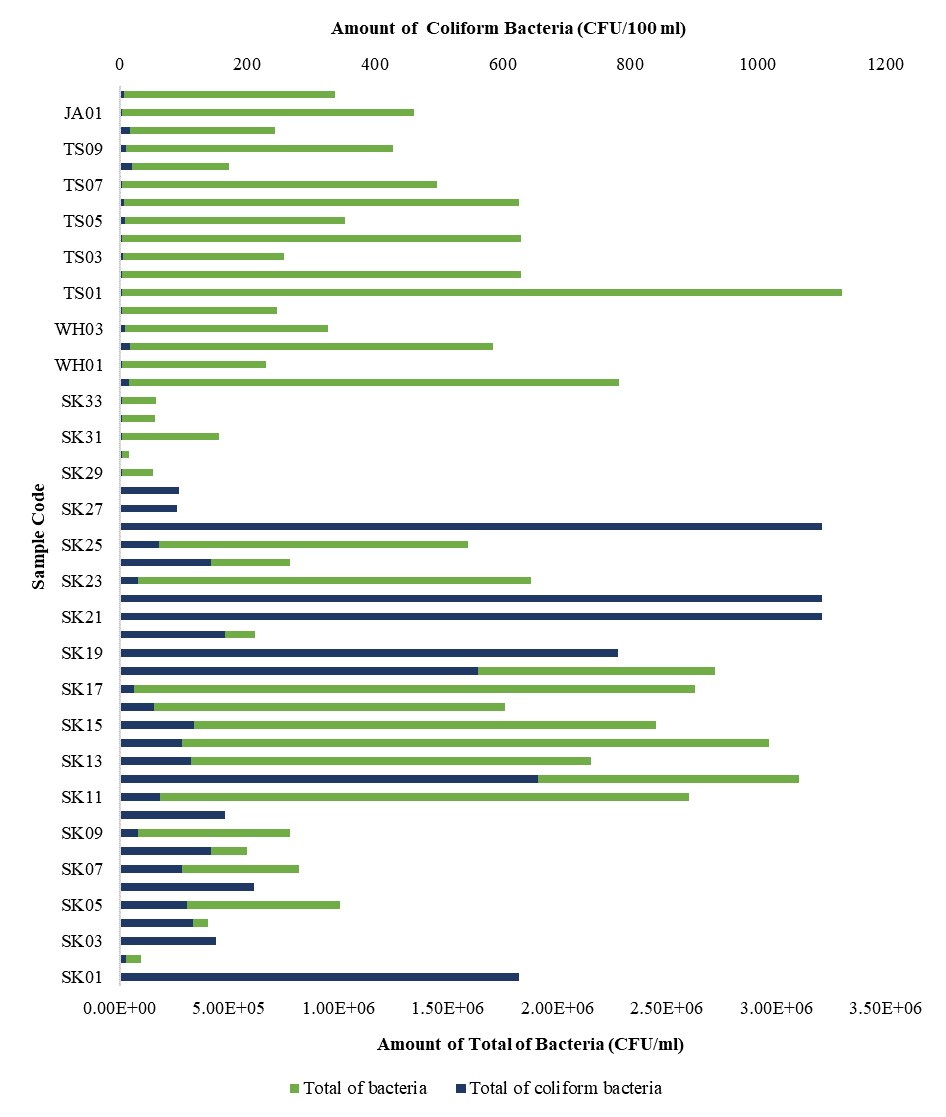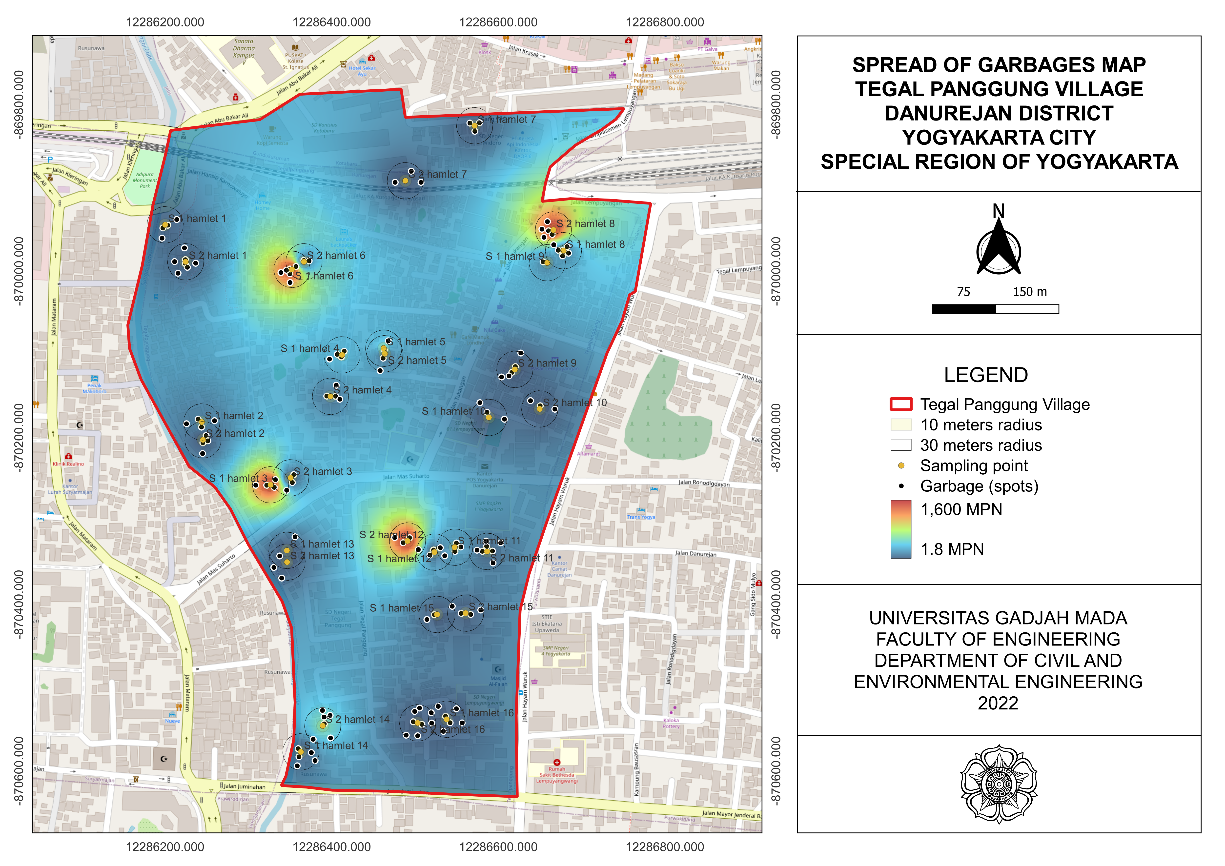Health Risk Assessment of Heavy Metals in Shallot, Bantul Regency

Introduction: Shallots are one of the horticultural products in great demand by the public. Excessive heavy metal content in shallot will affect people's health who consume it. This study examines the health risks of the people who consume shallot products produced in Srigading Village. Methods: Determination of sampling locations was carried out by purposive sampling method on shallot cultivation land that was ready to harvest, as many as 30 points, in September 2021. Soil and shallot samples were tested for the heavy metal content of Pb, Cd, Co, and Ni. The public health risk assessment was analyzed by looking at the Transfer Factor (TF) value, daily intake, health risk index, hazard index, and cancer risk. Results and Discussion: The concentration of heavy metals in shallots is Pb 19.14 – 30.04 mg kg-1, Cd 1.03 – 2.21 mg kg-1, Co 8.58 – 15.08 ppm, and Ni 6.00 – 10.09 mg kg-1. The average value of Transfer Factor (TF) shows metal uptake by shallots with metal levels Cd (1.07) > Pb (1.03) > Ni (0.73) > Co (0.46). The average daily dose shows that the daily consumption in children is higher than the daily dose for adults. Conclusion: Children are more at risk of being exposed to heavy metals compared to adults in consuming shallots based on the hazard index value. The continuous use of chemical fertilizers and chemical pesticides in shallot farming must be controlled to prevent the increase of accumulation of heavy metals in land and agricultural products.
Rehman AU, Nazir S, Irshad R, Tahir K, ur Rehman K, Islam RU, et al. Toxicity of Heavy Metals in Plants and Animals and Their Uptake by Magnetic Iron Oxide Nanoparticles. J Mol Liq. 2021;321(114455):1-33. https://doi.org/10.1016/j.molliq.2020.114455
Wallace DR, Djordjevic BA. Heavy Metal and Pesticide Exposure: A Mixture of Potential Toxicity and Carcinogenicity. Curr Opin Toxicol. 2020;19(1):72–79. https://doi.org/10.1016/j.cotox.2020.01.001
Zhong C, Feng Z, Jiang W, Xiao L, Zhang X, Zhao Y, et al. Evaluation of Geogenic Cadmium Bioavailability in Soil-Rice System with High Geochemical Background Caused by Black Shales. J Soils Sediments. 2021;21(2):1053–1063. https://doi.org/10.1007/s11368-020-02802-0
Hossain MM, Chowdhury MA, Hasan MJ, Rashid MHA, Acter T, Khan MN, et al. Heavy Metal Pollution in The Soil-Vegetable System of Tannery Estate. Environ Nanotechnology, Monit Manag. 2021;16(100557):1-11. https://doi.org/10.1016/j.enmm.2021.100557
Hoang HG, Chiang CF, Lin C, Wu CY, Lee CW, Cheruiyot NK, et al. Human Health Risk Simulation and Assessment of Heavy Metal Contamination in a River Affected by Industrial Activities. Environ Pollut. 2021;285(117414):1-9. https://doi.org/10.1016/j.envpol.2021.117414
Yakamercan E, Ari A, Aygün A. Land Application of Municipal Sewage Sludge: Human Health Risk Assessment of Heavy Metals. J Clean Prod. 2021;319(128568):1-11. https://doi.org/10.1016/j.jclepro.2021.128568
Kominko H, Gorazda K, Wzorek Z. Effect of Sewage Sludge-Based Fertilizers on Biomass Growth and Heavy Metal Accumulation in Plants. 2022;305(114417):1-9. https://doi.org/10.1016/j.jenvman.2021.114417
Long Z, Zhu H, Bing H, Tian X, Wang Z, Wang X, et al. Contamination, Sources and Health Risk of Heavy Metals in Soil and Dust from Different Functional Areas in an Industrial City of Panzhihua City, Southwest China. J Hazard Mater. 2021;420(126638):1-11. https://doi.org/10.1016/j.jhazmat.2021.126638
Tariq FS. Heavy Metals Concentration in Vegetables Irrigated with Municipal Wastewater and Their Human Daily Intake in Erbil city. Environ Nanotechnology, Monit Manag. 2021;16(100475):1-8. https://doi.org/10.1016/j.enmm.2021.100475
Naangmenyele Z, Ncube S, Akpabey FJ, Dube S, Nindi MM. Levels and Potential Health Risk of Elements in Two Indigenous Vegetables from Golinga Irrigation Farms in the Northern Region of Ghana. J Food Compos Anal. 2021;96(103750):1-9. https://doi.org/10.1016/j.jfca.2020.103750
Chen XX, Liu YM, Zhao QY, Cao WQ, Chen XP, Zou CQ. Health Risk Assessment Associated with Heavy Metal Accumulation in Wheat After Long-term Phosphorus Fertilizer Application. Environ Pollut. 2020;262(114348):1-9. https://doi.org/10.1016/j.envpol.2020.114348
Defarge N, Spiroux de Vendí´mois J, Séralini GE. Toxicity of Formulants and Heavy Metals in Glyphosate-based Herbicides and Other Pesticides. Toxicol Reports. 2018;5(1):156–163. https://doi.org/10.1016/j.toxrep.2017.12.025
World Health Organization. Guidelines for Drinking-Water Quality-4th ed. Geneva: World Health Organization;2011. http://apps.who.int/iris/bitstream/10665/44584/1/9789241548151_eng.pdf
District Central Statistic of DI Yogyakarta. DI Yogyakarta Province in Figures 2018. Yogyakarta: District Central Statistic of DI Yogyakarta; 2018. https://yogyakarta.bps.go.id/
Halim. Efisiensi dan Risiko Usahatani Bawang Merah di Desa Srigading, Kapanewon Sanden, Kabupaten Bantul. Skripsi. DI Yogyakarta: Universitas Muhammadiyah Yogyakarta; 2017. http://repository.umy.ac.id/handle/123456789/14457
Affum AO, Osae SD, Kwaansa-Ansah EE, Miyittah MK. Quality Assessment and Potential Health Risk of Heavy Metals in Leafy and Non-leafy Vegetables Irrigated with Groundwater and Municipal-Waste-Dominated Stream in the Western Region, Ghana. Heliyon. 2020;6(12):e05829. https://doi.org/10.1016/j.heliyon.2020.e05829
Guo J, Zhang Y, Liu W, Zhao J, Yu S, Jia H, et al. Incorporating in Vitro Bioaccessibility into Human Health Risk Assessment of Heavy Metals and Metalloid (As) in Soil and Pak Choi (Brassica chinensis L.) from Greenhouse Vegetable Production Fields in a Megacity in Northwest China. Food Chem. 2021;373(131488):1-8. https://doi.org/10.1016/j.foodchem.2021.131488
Vasseghian Y, Sadeghi Rad S, Vilas-Boas JA, Khataee A. A global Systematic Review, Meta-analysis, and Risk Assessment of The Concentration of Vanadium in Drinking Water Resources. Chemosphere. 2021;267(128904):1-7. https://doi.org/10.1016/j.chemosphere.2020.128904
Esmaeilzadeh, M, Jaafari, J, Mohammadi, AA, Panahandeh, M, Javid, A, Javan, S. Investigation of the Extent of Contamination of Heavy Metals in Agricultural Soil Using Statistical Analyses and Contamination Indices. Hum Ecol Risk Assess. 2019;25(5):1125–1136. https://doi.org/10.1080/10807039.2018.1460798
Jafarzadeh N, Heidari K, Meshkinian A, Kamani H, Mohammadi AA, Conti GO. Non-Carcinogenic Risk Assessment of Exposure to Heavy Metals in Underground Water Resources in Saraven, Iran: Spatial Distribution, Monte-carlo Simulation, Sensitive Analysis. Environ Res. 2022;204(112002):1-11. https://doi.org/10.1016/j.envres.2021.112002
Indonesian Soil Research Institute. Technical Guidelines for the Implementation of Soil Fertility Research. Bogor: IAARD Press;2015.
Eviati, Sulaeman. Chemical Analysis of Soil, Plants, Water and Fertilizer. Technical Guidelines-2th ed. Bogor: Indonesian Soil Research Institute;2009. http://balittanah.litbang.deptan.go.id
Sisay B, Debebe E, Meresa A, Abera T. Analysis of Cadmium and Lead Using Atomic Absorption Spectrophotometer in Roadside Soils of Jimma Town. J Anal Pharm Res. 2019;8(4):144-147. https://doi.org/10.15406/japlr.2019.08.00329
Alloway BJ. Heavy Metal in Soils. John Willey and Sons Inc., New York; 1995.
National Food and Drug Agency. Regulation of the Food and Drug Supervisory Agency Number 5 of 2018 about the Maximum Limit of Heavy Metal Contamination in Processed Food. Jakarta: National Food and Drug Agency; 2018.
Guo G, Lei M, Wang Y, Song B, Yang J. Accumulation of As, Cd, and Pb in Sixteen Wheat Cultivars Grown in Contaminated Soils and Associated Health Risk Assessment. Int J Environ Res Publ Health. 2018;15(11):2601. https://doi.org/10.3390/ijerph15112601
United States Enviromental Protection Agency the Integrated Risk Information System. US Environmental Protection Agency's integrated risk information system. Environmental protection agency region I. Washington DC: United States Enviromental Protection Agency; 2011. http://www.epa.gov/iris/
Food and Agriculture Organization of the United Nations. Food supply - Crops Primary Equivalent. Roma: Food and Agriculture Organization of the United Nations; 2013. http://www.fao.org/faostat/en/#data/CC
United States Enviromental Protection Agency. Supplementary Guidance for Conducting Health Risk Assessment of Chemical Mixtures. Washington DC: United States Enviromental Protection Agency; 2000. https://www.epa.gov/
Food and Nutrition Board. Dietary Reference Intakes for Water, Potassium, Sodiu, Chloride, and Sulfate. Washington DC: The National Academies Press; 2004.
United States Enviromental Protection Agency. Multimedia, Multi-pathway and Multi-receptor Risk Assessment (3MRA) Modellling System. Washington DC: United States Enviromental Protection Agency; 2002. https://www.epa.gov/
Kan X, Dong Y, Feng L, Zhou M, Hou H. Contamination and Health Risk Assessment of Heavy Metals in China's Lead–Zinc Mine Tailings: A Meta–Analysis. Chemosphere. 2021;267(128909):1-9. https://doi.org/10.1016/j.chemosphere.2020.128909
Ruslinda Y, Gunawan H, Goembira F, Wulandari S. Pengaruh Jumlah Kendaraan Berbahan Bakar Bensin terhadap Konsentrasi Timbal (Pb) di Udara Ambien Jalan Raya Kota Padang. Semnas Sains dan Teknologi Lingkungan II. 2016;1(1):162-167. https://faperta.unand.ac.id/images/fileTL/SNSTL_II/OP_029.pdf
Nurmawan W, Ogie TB, Kainde RP. Analisis Kandungan Timbal (Pb) dalam Daun Tanaman di Ruang Terbuka Hijau. Eugenia. 2019;25(3):79–85.
https://ejournal.unsrat.ac.id/index.php/eugenia/article/view/31403
Purwoko D, Prastiwi DE. Pengaruh Lokasi dan Waktu Pengukuran Sumber Bergerak (Kendaraan) dengan Kandungan Timbal (Pb) pada Udara Underpass di Simpang Lima Mandai Kota Makassar. Sulolipu: Media Komunikasi Sivitas Akademika dan Masyarakat. 2019;17(2): 39. https://doi.org/10.32382/sulolipu.v17i2.825
Li H, Yang Z, Dai M, Diao X, Dai S, Fang T. Input of Cd from Agriculture Phosphate Fertilizer Application in China during 2006–2016. Sci Total Environ. 2020;698(134149):1-11. https://doi.org/10.1016/j.scitotenv.2019.134149
Meng M, Yang L, Wei B, Cao Z, Yu J, Liao X. Plastic Shed Production Systems: The Migration of Heavy Metals from Soil to Vegetables and Human Health Risk Assessment. Ecotoxicol Environ Saf. 2021;215(112106):1-10. https://doi.org/10.1016/j.ecoenv.2021.112106
Darmono. Logam Dalam Sistem Biologi Makhluk Hidup. Jakarta: UI Press;1995.
Zhang Y, Wang S, Gao Z, Zhang H, Zhu Z, Jiang B, et al. Contamination Characteristics, Source Analysis and Health Risk Assessment of Heavy Metals in The Soil in Shi River Basin in China Based on High Density Sampling. Ecotoxicol Environ Saf. 2021;227(112926):1-11. https://doi.org/10.1016/j.ecoenv.2021.112926
Jing-yu P, Shuai Z, Yingyue H, Bate B, Han K, Yunmin C. Soil Heavy Metal Pollution of Industrial Legacies in China and Health Risk Assessment. Science of the Total Environment. 2021;816(151632):1-12. http://dx.doi.org/10.1016/j.scitotenv.2021.151632
Bibi N, Shah MH, Khan N, Mahmood Q, Aldosari AA, Abbasi AM. Analysis and Health Risk Assessment of Heavy Metals in Some Onion Varieties. Arab J Chem. 2021;14(10):103364. https://doi.org/10.1016/j.arabjc.2021.103364
Liu X, Gu S, Yang S, Deng J, Xu J. Heavy Metals in Soil-Vegetable System Around E-Waste Site and The Health Risk Assessment. Sci Total Environ. 2021;779(146438):1-10. https://doi.org/10.1016/j.scitotenv.2021.146438
Copyright (c) 2022 JURNAL KESEHATAN LINGKUNGAN

This work is licensed under a Creative Commons Attribution-NonCommercial-ShareAlike 4.0 International License.
1. Copyright of all journal manuscripts is held by the Jurnal Kesehatan Lingkungan.2. Formal legal provisions to access digital articles of electronic journal are subject to the provision of the Creative Commons Attribution-ShareAlike license (CC BY-NC-SA), which means that Jurnal Kesehatan Lingkungan is rightful to keep, transfer media/format, manage in the form of databases, maintain, and publish articles.
3. Published manuscripts both printed and electronic are open access for educational, research, and library purposes. Additionally, the editorial board is not responsible for any violations of copyright law.
JKESLING by UNAIR is licensed under a Creative Commons Attribution-ShareAlike 4.0 International License.







































